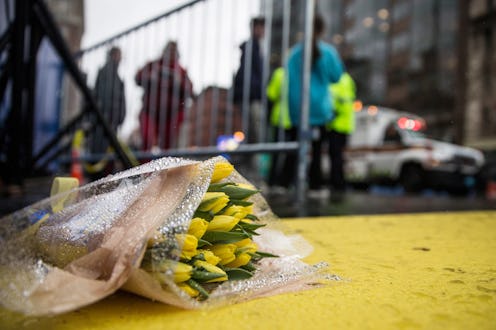News
Dzhokhar Tsarnaev's Defense Will Be Over Quickly
Now that the prosecution has rested its case against Dzhokhar Tsarnaev, the Boston Marathon bombing trial's first phase is nearing its end. Though Tsarnaev's lawyers only started presenting on Monday, the defense's case will be significantly shorter. Compared to the prosecution's case, which heard 92 witnesses and lasted 15 days, Tsarnaev's defense team will only call three witnesses and is expected to conclude on Tuesday night. The trial will then move to the jury, who will most likely convict Tsarnaev for his role in the 2013 bombings and begin its second phase.
On Monday, Tsarnaev's lawyers began their case by filing a motion to acquit Tsarnaev on all counts. In their opening statements, the defense admitted that their client participated in the bombings, but argued that his older brother, Tamerlan, was the driving force behind the bombings. Their strategy is not to shirk blame, exactly, but to downplay Tsarnaev's role with the ultimate goal of helping their client avoid the death penalty.
For their case, the defense is expected to call three witnesses. On Monday afternoon, they called to the stand forensics investigator Gerald R. Grant Jr., who testified that cell phone records suggest that Tamerlan purchased the pressure cookers, BB pellets, and the two backpacks that hid the bomb devices by himself.
They also asked for testimony from Michelle Gamble, a photographer for the FBI whom the prosecution had also called to the stand. This time, Gamble was asked to identify a series of photographs taken right before the explosions that suggest that Tsarnaev didn't deliberately target 8-year-old Martin Richard and his family.
On Tuesday, the defense called their third witness, digital forensics expert Mark Spencer, who testified that a laptop belonging to Tamerlan showed searches for radio transmitters, fireworks, and Ruger P95 handguns (a Ruger P95 gun was used to fatally shoot MIT officer Sean Collier) in the weeks before the bombings, while a laptop belonging to Tsarnaev showed no such searches in that same time period, only visits to social media sites like Facebook.
After presenting testimony from their three witnesses, the defense team, led by Miriam Conrad, is expected to close its case on Tuesday. The jury will then decide whether to convict Tsarnaev on the 30 federal charges against him — 17 of which are capital murder charges — in the bombings that killed three people and injured more than 260. If the jury finds him guilty, the trial will then move to its penalty phase, during which the same jury will decide whether Tsarnaev should get the death penalty or sentenced to life in prison without the possibility of parole.
During the penalty phase, Tsarnaev's lawyers will emphasize factors that will help keep him from the death penalty, such as his age at the time of the crime, his brother's influence, and their volatile upbringing in Kyrgyzstan and Russia. Judy Clarke, a member of Tsarnaev's defense team, has helped several notorious clients, such as the Unabomber Ted Kaczynski, Olympic Park Bomber Eric Rudolph, and Arizona shooter Jared Loughner, avoid death row.
Meanwhile, the prosecution will push for execution by reiterating the savage nature of the crime and the death of a child.
Images: Getty Images (2)
